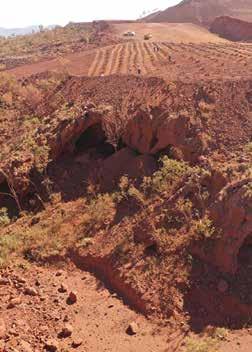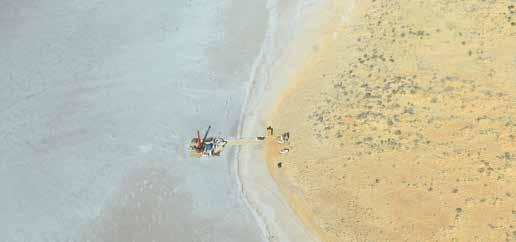
6 minute read
Inside: Rio Tinto resignations af ter Juukan Gorge disaster
Rio Tinto chairman Simon Thompson and non-executive Board Director Michael L’Estrange will resign following ongoing repercussions from the destruction of the 46,000-yearold rock caves in May last year. The company announced the two would step down from their roles with L’Estrange stepping down after this year’s annual general shareholder meetings and Thompson to follow in 2022.
The National Native Title Council (NNTC), which called for largescale cultural change from Thompson in September last year, welcomed the news.
Advertisement
“We are pleased to hear that Mr Thompson has finally taken accountability for the poor governance decisions which led to the tragic events at Juukan Gorge,” NNTC CEO Jaimie Lowe said.
“Not only did we see the tragic theft of cultural heritage at Juukan, but the Rio Tinto board’s handling of the disaster was profoundly disappointing and an insult to the traditional owners who continued to act in good faith, even after their heritage was intentionally destroyed. Rio Tinto has finally realised that the leaders who presided over this disaster could not be the leaders entrusted to repair it. It’s a pity that they only execute these necessary reforms when they’re under intense public or shareholder scrutiny.” Aboriginal leader and academic Professor Marcia Langton says it’s too little too late.
“Most people in the Aboriginal community are very well aware that this company is prepared to continue on its merry way with poor governance and business as usual,” Professor Langton told ABC after the announcement, though she expressed her concern that Thompson hopes to stay on for another full year.
Professor Langton also wrote in a recent opinion piece that she was approached by Rio Tinto in June last year to lead an internal inquiry into the blast and the miner’s cultural heritage processes.
“After some discussion, it became apparent that Rio Tinto leaders were not committed to transparency or independence, so I declined. What Rio did seem committed to, however, was finding a blackfella to clean up its PR disaster (perhaps not ironic, given the Indigenous relations and PR departments were amalgamated under former CEO JeanSebastien Jacques’ watch in 2016).”
The announcement of these resignations came in early March, seven months after the forced resignations of Chief Executive Jean-Sebastian Jacques and two senior executives, head of iron ore Chris Salisbury and head of corporate relations Simone Niven. Investors have continued to call for both Thompson and L’Estrange to step down from their positions over this time, with many unsatisfied that former chief financial officer Jakob Stausholm was appointed the new Chief Executive, replacing Mr Jacques, instead of an outside candidate.
Both the Chair and the Board Director referred to the impact left by the destruction of the rock shelters in a joint statement announcing their resignations.
Thompson mentioned that his achievements since becoming chairman in 2018 and over his seven years on the board had all been overshadowed by the destruction of the Juukan Gorge rock shelters and that, as Chairman, he took responsibility for the failings behind the tragic event.
“Over the past eight months, we have engaged extensively with investors, government, civil society, Indigenous leaders and, most importantly, traditional owners to learn the lessons from Juukan Gorge. We have taken decisive action to address the weaknesses identified in our risk management and governance, while also acknowledging the need to improve our work culture and to rebuild relationships,” said Mr Thompson in his announcement.
“While I am pleased with the progress we have made in many areas, the tragic events
Rio Tinto’s destruction of Juukan Gorge. Photo: Puutu Kunti Kurrama and Pinikura Aboriginal Corporation.
at Juukan Gorge are a source of personal sadness and deep regret, as well as being a clear breach of our values as a company.”
L’Estrange, who will have served on the Board for six and a half years when he steps down said: “I wish Jakob (Stausholm, Chief Executive from January 2021) and the new executive well for the future as they build on Rio Tinto’s many strengths and continue to implement the critical changes aimed at ensuring that an occurrence such as the destruction of the Juukan Gorge rock shelters never happens again.”
Drilling on Lake Torrens continues despite legal action
The Aboriginal Lands Parliamentary Standing Committee has launched an inquiry into Aboriginal heritage policies and standards in South Australia.
This comes after public concern of Premier Steven Marshall’s decision to approve exploratory drilling on significant Aboriginal site Lake Torrens under Section 23 of the Heritage Act. The act allows Aboriginal sites, objects, or remains to be “damaged, disturbed or interfered with” under authorisation from the Minister for Aboriginal Affairs and Reconciliation, currently the Premier. The Committee will consider the operations of the Aboriginal Heritage Act 1988, management of Aboriginal Heritage in South Australia, how to best to protect intangible Aboriginal Heritage and intellectual property. South Australian Native Title Services (SANTS) launched a Freedom of Information request for documents relating to the Premier’s decision to approve the project. “It reveals that the South Australian Heritage Committee said ‘no, don’t mine’, so he’s gone against the advice of his own agency,” SANTS CEO Keith Thomas said. “There has been a major push to protect cultural heritage sites across the country since the devastating impact of the Juukan Gorge destruction last year, but that protection didn’t seem to be happening here in South Australia. We are glad these concerns finally seem to be taken notice of,” he said.
“Greater attention is required to ensure the protection of Aboriginal sites such as Section 23 of the Heritage Act, moving forward. To that end, South Australia should move to adopt the best practice standards in Indigenous Cultural Heritage Management to give traditional owners final say over what happens in their own country.”
These International Standards were designed to reference the minimum standards set out in the United Nations Declaration on the Rights of Indigenous Peoples (UNDRIP) and provide clear guidance on dealing with Indigenous cultural heritage worldwide.
The National Native Title Council CEO Jamie Lowe agreed: “In the wake of Juukan Gorge, every government in Australia should have received the wakeup call and should be in the process of scrutinising and reforming their archaic legislation. Cultural heritage laws, federally and in the states and territories are not protecting cultural heritage. Not only does this fail to uphold the rights and interests of traditional owners but it fails all Australians, because it risks us losing so much of what makes our continent unique.”

Argonaut Resources mining equipment on Lake Torrens. Photo: Kokatha site card holders.
The National Native Title Council recently put in submissions focusing on the importance of these Standards for both the Inquiry into the destruction of Juukan Gorge and consultation on Western Australia’s Draft Aboriginal Heritage Bill. The Adnyamathanha, Barngarla, Kokatha and Kuyani people all have stories connected to the lake. In March, the Barngarla Determination Aboriginal Corporation launched legal action in the form of a judicial review to halt drilling. “These proceedings seek the reversal of an authorisation given by the State of South Australia to mining company, Kelarary Pty Ltd, to damage sacred Aboriginal heritage at Lake Torrens as part of their exploration drilling program,” the corporation said. Argonaut Resources, the company granted permission to begin exploratory drilling on the sacred site said: “The company notes that there are no registered Barngarla heritage sites at Lake Torrens.”
“Argonaut notes that exploration works being undertaken at the Murdie project have been duly authorised. The company is confident that the State’s authorisation process was robust. Argonaut is continuing with final preparation for drilling at the Murdie site.”
Despite the bid for a judicial review, the State Government has confirmed the company will be allowed to continue drilling.



